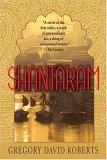
Well, I just finished the first of my literary birthday gifts, this one from a friend visiting from Mumbai. He said, "This really captures the feeling of Bombay," then handed me the 935 page, 2lb-11oz paperback UK edition of Gregory David Roberts' SHANTARAM. Unbeknownst to me, it is an international bestseller. My friend noticed my discomfort at the size of the book: "Just read the first 100 pages, it's worth it."
I trust this friend, and I am curious about Bombay. But more than that, I'm curious about what makes this material warrant the book's absurd scale. My first novel, which at a mere 120 thousand words (about 350 print pages) has been called "big" and "sprawling" in the nicest and most helpful ways by those rejecting it, will probably never see print in its current configuration. So what does SHANTARAM have that made publishers ignore its violation of the cardinal rule of debut fiction: keep it simple?
In a word: PLATFORM. This is an autobiographical novel with one of the best author platforms I have ever seen. Roberts was a reformed heroin addict in an Australia prison, doing a hefty sentence for armed robbery. He escaped prison, went to India on a fake New Zealand passport, toured India and learned to speak Marathi, Hindi, and Urdu like a native, lived in a Bombay slum where he opened a free clinic, joined the Bombay mafia and worked in black market currency and passports, dabbled in the Bollywood movie biz, went on a gunrunning mission in Afghanistan during the war with Russia, eventually got caught in Europe, and then served out his remaining sentence for the Australia crimes. In the book's acknowledgements, he notes that 600 pages of his original manuscript, penned in prison, were lost.
(Meaning the story was supposed to be 1500 pages?)
I'll try not to bitch about the length, especially since it's what kept me reading. That nagging question: why is it so big? I concluded that it simply suffers from the problem that many autobiographical first novels suffer, the need to include every good idea, every insight, every interesting character, as if there will be no more novels after this one. And while I did find myself wishing Roberts had saved some of the material for his next opus, I must concede that it feels well-researched, and it REALLY makes me want to go to Bombay. The book's architecture is meandering, but so are the slums of Bombay, and so I'll cut him some slack.
Some critics have complained about Roberts' "larger than life" characters, which is a term I'm struggling with now. As in too colorful, too implausible? If so, I disagree. I, like Roberts, am a person who is drawn to weirdos. They do exist. There is no need to write bland characters, or to be bland in life.
But if "larger than life" means cliche, then maybe I see critics' point. One does get tired of hearing about the winning smile of Prabaker, the protag's first friend in India, or the liquid green eyes of Karla, the aloof love interest. But so what. This book is a ride. A long, long, ride, like a Bollywood movie, complete with bad guys and a dancing bear. So maybe the movie could be edited. Maybe the hero wins too many battles or has too much flowery, good sex. (I mean really, no fumbling or bumbling? No icky fluids?) So what if it falls into that story paradigm of cross-cultural searching and assimilation. My Indian friend wasn't offended. It's a little like Roberts' take on visiting India: you just gotta trust and ride.
Aside: while I was reading this book, I noticed Vikram Chandra sold a 1200-page novel about the Bombay crime and movie underworld. Is this becoming a genre? The Bombay supernovel?
1 comment:
A reader asks: did you really weigh this book? YES! I took it to the self serve island at the post office. Hey, I was curious.
Post a Comment